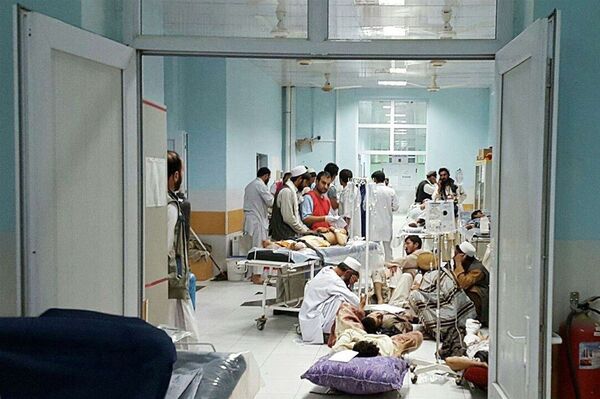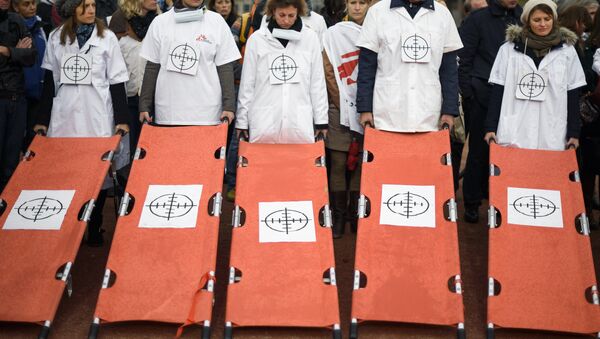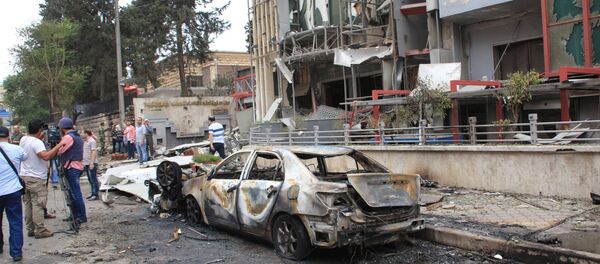Resolution 2286, co-sponsored by more than 80 member states, strongly condemns attacks and threats against the wounded and sick, medical personnel and humanitarian personnel exclusively engaged in medical duties, their means of transport and equipment, as well as hospitals and other medical facilities.
Speech by Dr. Joanne Liu International President, Médecins Sans Frontières (MSF) https://t.co/KA97wuUm8r pic.twitter.com/EcaQBhIlm0
— MSF INDIA (@MSF_Ind) May 5, 2016
A study by the International Committee of the Red Cross (ICRC) has found that between 2012 and 2014 there were 2,400 attacks against patients, health personnel, medical facilities, ambulances and other medical transports in 11 countries.
But even outside the war zones, the treatment of refugees and migrants in Europe, Australia and beyond, has shown a shocking lack of humanity says a statement from MSF UK (Doctors without Borders).
Attacks on hospitals are not sad realities we must get used to. They're abominations. Watch my speech to the #UNSC https://t.co/u7iFDJRykd
— Peter Maurer (@PMaurerICRC) May 3, 2016
Debating the resolution Peter Maurer, President of the ICRC, said that as hospitals and health centers were bombed, a painful paradox demonstrated that the availability of health care was at its lowest in times of the greatest need.
MSF president Joanne Liu, called it "an epidemic", adding that "hospitals and patients have been dragged onto the battlefield." In Afghanistan, Central African Republic, South Sudan, Syria, Ukraine and Yemen, she said, hospitals were routinely bombed, raided, looted or burned to the ground, and medical personnel were threatened and patients were shot in their beds.
Link to my remark at UN Security Council, May 3rd-Stop these attacks- we will not leave patients behind https://t.co/G5oj5cxEg4 via @AddThis
— Dr Joanne Liu (@JoanneLiu_MSF) May 4, 2016
Errors or War Crimes?
Malaysia's representative Siti Hajjar Adnin recalled that hospitals in Gaza had been hit by Israeli strikes in which thousands of civilians had been killed, and that an MSF hospital in Afghanistan had been attacked by the United States military.
Representative of the United States Michele J. Sison expressed regret over the airstrikes on the MSF hospital, and offered condolences, noting that more than a dozen US military personnel had been disciplined for the errors that had led to the bombing.

However, Doctors without Borders insist that such attacks should not be written off as mistakes, because in reality, as Dr Liu said, they amounted to a massive, indiscriminate and disproportionate targeting of civilians in urban settings.
Venezuela's representative Rafael Darío Ramírez Carreño agreed that it was incomprehensible that such violations of humanitarian law could be considered mere "errors" when they were, in fact, war crimes. They must be investigated impartially, with the perpetrators held accountable.
Noting that accountability started with impartial fact-finding, Dr Liu said calls for independent investigations had gone unheeded, stressing that, while the nature of warfare might have changed, the rules of war had not.
This sentiment was echoed by the United Nations Secretary-General Ban Ki-moon who noted that "even wars have rules".
"When so-called surgical strikes are hitting surgical wards, something is deeply wrong," Ban Ki-moon said.
He described attacks on hospitals as a war crime, urging all member states, parties to conflict and other relevant actors to heed the Council's demands.
The protection of civilians was the responsibility of parties to conflict according to the Geneva Conventions, said Russian representative Evgeny Zagaynov, adding that, while there was no doubt that medical personnel worked within their mandate, it was also essential to respect the sovereignty of States.
Protecting civilians in times of conflict will be the key theme of the first-ever World Humanitarian Summit (WHS) to be held in Istanbul on 23 and 24 May. However, Doctors without Borders, having initially hailed the initiative have announced that they are pulling out. In a statement posted on MSF UK website its General Director Vickie Hawkins says:
"We can no longer see how the WHS will help the humanitarian sector to address the massive needs caused by continuing violence against patients and medical staff in Syria, Yemen and South Sudan; by civilians intent on fleeing being blocked at borders in Jordan, Turkey and Macedonia; by the inhumane treatment of refugees and migrants desperately trying to find safe haven in Greece and Australia…
"The summit has become a fig-leaf of good intentions, allowing these systematic violations, by states above all, to be ignored."



